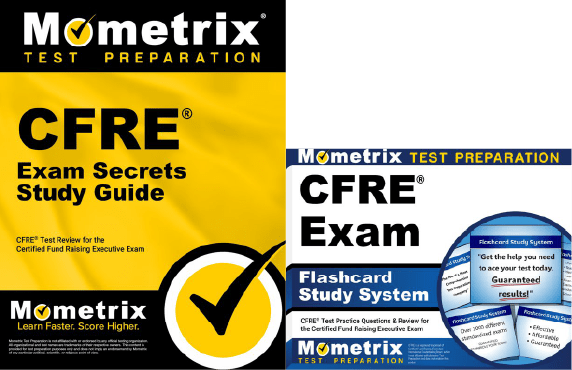If you need help studying for the Certified Fund Raising Executive (CFRE®) exam or just want some more information about what the exam is like, you’ve come to the right place.
Click below to take a free CFRE practice test!
What’s on the Exam?
How to Register
Exam Scores
Retaking the Exam
What Test-Takers Are Saying
FAQs
Exam Eligibility
Before you can register to take the CFRE test, you’ll need to meet the eligibility requirements, which are based on a point system.
There are the points you need to accrue in each area (your application will calculate your points for you automatically!):
- Education (80 points): You can earn education points via continuing education, authoring, degrees, and service learning.
- Professional Practice (36 points): You can earn professional practice points by having worked as a fundraising consultant for nonprofits or as a fundraising staff member for at least 36 months in the past five years.
- Professional Performance (55 points): You can earn professional performance points via raised funds, communications projects, and management projects.
Once you have enough points, you’ll be set to register for the exam!
What’s on the Exam?
First, let’s talk about the questions on the exam. There are 200 multiple-choice questions total, but only 175 of the questions will count toward your score. Why is that?
The 25 unscored questions on the exam are called “pretest” questions. These are added to the exam to determine if they’re good enough questions to add to future versions of the test.
The trick is that you won’t have any way of knowing which questions are scored and which ones are pretest questions. They will appear just like the scored questions throughout the test.
The time limit for the exam is 4 hours. There aren’t any scheduled breaks, but you’re free to take restroom breaks as needed.
Let’s take a closer look at the different sections of the exam.
1. Current and Prospective Donor Research
26 scored questions
- Developing a list of prospective donors
- Implementing, maintaining, and utilizing a secure data management system
- Collecting and analyzing current and prospective donor information
- Qualifying and rating current and prospective donors on linkage, ability, and interest
- Communicating and validating relevant donor information with key stakeholders
2. Securing the Gift
39 scored questions
- Developing a case for support by involving stakeholders to communicate the rationale
- Identifying solicitation strategies and tools
- Developing and implementing specific solicitation plans
- Preparing donor-focused solicitation communications
- Asking for and securing gifts to generate financial support
3. Relationship Building
51 scored questions
- Initiating and strengthening relationships with constituents through systematic cultivation and stewardship plans
- Developing and implementing a comprehensive communications plan to inform constituents
- Creating opportunities to position the donor through their giving as part of the organization
- Acknowledging and recognizing donor gifts in ways that are meaningful and appropriate
- Creating a comprehensive strategy for engagement of constituents that leads to action with the organization
4. Volunteer Involvement
10 scored questions
- Assessing organizational readiness to engage volunteers
- Creating structured processes for volunteers
- Developing role descriptions to empower and support volunteers
- Engaging volunteers in various capacities in the fundraising process
- Participating in recruiting capable and representative volunteer leadership
- Identify need and opportunities to engage volunteers
5. Leadership and Management
31 scored questions
- Demonstrating leadership that advances fundraising practice
- Advocating for and supporting a culture of philanthropy
- Ensuring sound administrative and management policies and procedures are in place
- Participating in the organization’s strategic planning process
- Designing and implementing fundraising plans and budgets
- Employing marketing and public relations principles and tools
- Conducting ongoing performance measurement and analysis of fundraising programs
- Recruiting, training, and supporting staff and volunteers
- Utilizing external services to optimize activities and outcomes
6. Ethics, Accountability, and Professionalism
18 scored questions
- Ensuring all fundraising activities and policies comply with ethical principles and legal standards
- Communicating principles of ethical fundraising to stakeholders
- Promoting ethical fundraising as a crucial component of philanthropy
- Honoring donors’ intent by clarifying, implementing, and monitoring instructions
- Ensuring allocations of donations are accurately documented in the organization’s records
- Reporting to constituents the sources, uses, impact, and management of donations
- Participating as an active and contributing member of the fundraising profession
- Ensuring all fundraising activities and policies align with the organization’s values
How to Register
To get started, you’ll need to submit an application on the CFRE website. The application will ask you for your contact information and any documentation to prove your eligibility (among other things).
Exam Scores
The test is scored using a scaled scoring method. Here’s how it works:
For every question you answer correctly, you get one point added to your raw score. At the end of the test, your final raw score will be converted to a scaled score. This scaled score will range somewhere between 200 and 800.
The reason your raw score is converted to a scaled score is because everyone who takes the test is given a slightly different set of questions. Since everyone has a different arrangement of questions, and because some questions are harder than others, converting your raw score to a scaled score ensures a more even playing field.
Retaking the Exam
If you didn’t get a passing score on your first try, that’s okay! You can schedule to retake the test after a 30-day waiting period.
Keep in mind that you will have to pay the full $375 retesting fee every time you retake the test.
What Test-Takers Are Saying
Don’t just take our word for it! See what real test-takers are saying about the CFRE exam:
“The exam is based on how CFRE sees fundraising. It doesn’t necessarily operate in the real world. You have to run with thinking you have a super amazing, involved, full board, for example. The main thing to remember is to think donor-centric. You’ll see answers that you as a fundraiser will look good but won’t be the most donor-centric answer and so will be incorrect.”

waffleseggsbacon
“If you’ve worked in a couple of different areas of fundraising, like annual fund, grants, and prospect research just for example, you’ll know enough about the different areas of the exam to do okay. If you really only know one area of fundraising and really don’t know anything about the others, then I suspect it will be a struggle.”

danthemanatee
“What I really had to do as someone who has been in this industry for 15+ years, I just had to get my brain to think like CFRE. For example, ‘volunteer’ means board members, not the people who come and do hours every week.”

HBSQ1
FAQs
How many questions are on the CFRE exam?
The exam contains 200 questions.
What is the time limit for the CFRE exam?
The exam is timed at 4 hours.
What is the passing score for the CFRE exam?
You’ll need to get a final scaled score of at least 500 to pass.
How much does the CFRE exam cost?
The testing fee is $875.
CFRE is a registered trademark of Certified Fund Raising Executives International Credentialing Board, which is not affiliated with Mometrix Test Preparation and does not endorse this page.



 CFRE Study Guide
CFRE Study Guide CFRE Flashcards
CFRE Flashcards